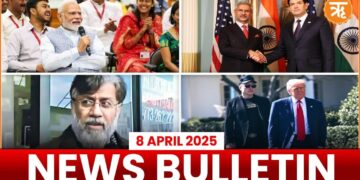Against the backdrop of escalating tensions between Russia and Western nations over the Ukraine conflict, Prime Minister Narendra Modi is set to visit Russia next week, his first since the war broke out. Concerning the Russia-Ukraine war, India maintains a cautious and balanced diplomatic stance. Meanwhile, besides Russia, the PM is also set to visit Austria, marking it to be the first by any Indian prime minister in almost 40 years, underscoring the rich historical connection between the two countries since 1949, when diplomatic relations were first established.
PM Modi’s upcoming visit to Russia on July 8 and 9, 2024, is strategically significant. India’s visit highlights its dedication to preserving historical relationships, even in the face of Western sanctions. At the request of President Vladimir Putin, the visit showcases strong bilateral ties, especially in the fields of energy and defense. India’s geopolitical balancing act includes continued reliance on Russian military hardware and increased imports of cheap Russian crude oil, crucial for the Russian economy amidst international isolation. With Russia aligning itself more closely with China and India taking a cautious stance within the Eurasian grouping, PM Modi’s visit aims to deepen diplomatic ties amid changing global dynamics.
Notably, India had recently abstained from a UN resolution condemning Moscow’s invasion of Ukraine, reflecting its nuanced approach to maintaining relations with both Russia and the West. PM Modi’s diplomatic visit to Russia amidst these complex dynamics signals India’s commitment to fostering robust partnerships while navigating sensitive global geopolitical landscapes.
Following his visit to Moscow, Modi will visit Austria, marking the first visit by an Indian prime minister in more than 40 years. Notably, the visit to Austria is his second trip to the European Union after taking oath for the rare third term. This visit highlights the historical connections between the two countries since establishing diplomatic relations in 1949. The ‘India-Austria Startup Bridge,’ introduced earlier this year, demonstrates joint efforts to promote innovation and entrepreneurship. PM Modi’s visit aims to strengthen bilateral cooperation in economic cooperation and technical advancement, bolstering India’s position in the global economy.
In the midst of great power rivalries, Modi’s diplomatic efforts in Russia and Austria showcase India’s diverse foreign policy strategy. These visits underscore India’s contribution to shaping a multipolar world order and are expected to impact global geopolitical alignments and regional stability. Analysts anticipate significant ramifications for international affairs as Modi negotiates challenging diplomatic terrain amid rising tensions and shifting alliances.
















Comments